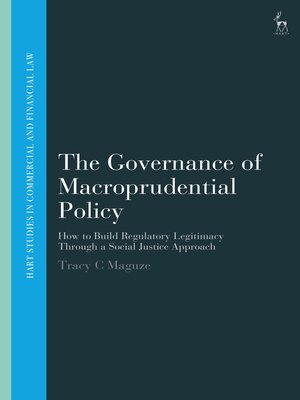The Governance of Macroprudential Policy
ebook ∣ How to Build Regulatory Legitimacy Through a Social Justice Approach · Hart Studies in Commercial and Financial Law
By Tracy C Maguze

Sign up to save your library
With an OverDrive account, you can save your favorite libraries for at-a-glance information about availability. Find out more about OverDrive accounts.
Find this title in Libby, the library reading app by OverDrive.



Search for a digital library with this title
Title found at these libraries:
| Library Name | Distance |
|---|---|
| Loading... |
This book critically examines the theoretical foundations and legal framework for macroprudential policy, its tools and governance in the UK, the US, and the EU. It goes deeper into a normative discussion of the legitimacy of macroprudential policy in these jurisdictions, where the mandate for maintaining financial stability has been delegated to independent authorities.
The Global Financial Crisis of 2007-2008 reopened debates regarding legitimacy of the independent regulatory state, given its democratic deficit. The response to a perceived legitimacy gap has been to increase political oversight in financial policymaking and regulation. The book posits that the real problem is not a lack of democracy, but rather a lack of social justice. Across the globe, there is growing dissatisfaction with a financial system and regulatory process that appear depersonalised and perpetuate inequalities. Citizens are calling for more socially just systems of governance and the future success of financial policymakers and regulators will hinge on this. Given the marked distributional effects that have been noted in some macroprudential policy tools, the book questions whether macroprudential policy should be solely based on highly rationalised and strongly quantitative reasons.
By proposing that macroprudential policymakers should have a social justice mandate alongside their financial stability mandate, as well as legal mechanisms for operationalising the added authority, the book contributes to the growing discourse on the role of social justice in public policy.
The Global Financial Crisis of 2007-2008 reopened debates regarding legitimacy of the independent regulatory state, given its democratic deficit. The response to a perceived legitimacy gap has been to increase political oversight in financial policymaking and regulation. The book posits that the real problem is not a lack of democracy, but rather a lack of social justice. Across the globe, there is growing dissatisfaction with a financial system and regulatory process that appear depersonalised and perpetuate inequalities. Citizens are calling for more socially just systems of governance and the future success of financial policymakers and regulators will hinge on this. Given the marked distributional effects that have been noted in some macroprudential policy tools, the book questions whether macroprudential policy should be solely based on highly rationalised and strongly quantitative reasons.
By proposing that macroprudential policymakers should have a social justice mandate alongside their financial stability mandate, as well as legal mechanisms for operationalising the added authority, the book contributes to the growing discourse on the role of social justice in public policy.







